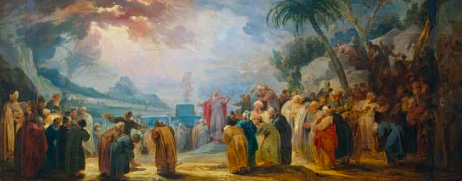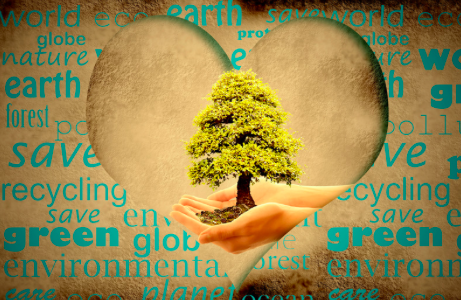What comes to mind when you think about the Law of the Old Testament? You may be like many modern believers who think of the Law as a collection of strange and irrelevant commands. This perspective comes from the clear cultural distance between many of the commands and modern faith and society (“Do not wear clothing woven of two kinds of materials.” – Lev. 19:9), as well as the way that Jesus and his disciples seem to set aside the Law. But if we look at the Law through ecological lenses we will find, hiding in plain sight, a dynamic way of life that is part of creation and given for the sake of creation.
The Law Embedded in Creation
It is tempting to think of the Law as the 613 explicit commands contained in the Hebrew Bible. The Law, or “Torah,” however, is technically the first five books of the Bible. This means that what we call the Law is not just the explicit commands but the stories in which they are embedded. It may be better to understand the Law as a comprehensive way of life. With this in mind, what we see from the beginning of the story is that divine creation and divine command go hand in hand. The world is created by God’s command, and as the various elements and creatures come into being they are instructed either to enable life to proliferate (“Let the land produce...” Gen. 1:11) or to directly facilitate this expansion (“Be fruitful and multiply” Gen. 1:22, 28). Humans are explicitly commanded to oversee and tend to this expansion of life in God’s new world. These vocational commands are an essential part of the original creation and its ongoing development.

The Mosaic Law in Service to Creation
This connection of creation with law continues in the codification of the Law at Mt. Sinai. The collection of commands that Moses delivers to the Israelites delineates a way of life that will define the people as they transition from serving Pharaoh’s life-denying regime in Egypt to serving God’s life-affirming reign in the land of Canaan. It is remarkably comprehensive as a guide for Israel to live with each other, their human neighbors, other creatures, and the land.
While I do not fully comprehend each command – particularly those commanding violence upon non-Israelites who inhabit Canaan – in general, the Mosaic law builds upon what is already inherent in creation in a way that helps Israel fulfill its vocation to be a “kingdom of priests and a holy nation” (Exod. 19:5) – pointing people to God and God’s life-giving purposes for creation.
We see this in the many commands that protect vulnerable creatures (both human and non-human) and the earth’s capacity to further life.
If you see the donkey of someone who hates you fallen down under its load, do not leave it here; be sure you help your enemy with it. – Exod. 23:5; see also Deut. 22:1-4; 25:4
For six years you are to sow your fields and harvest the crops, but during the seventh year let the land lie unplowed and unused. Then the poor among your people may get food from it, and the wild animals may eat what they leave. – Exod. 23:10-11.
If you come across a bird’s nest beside the road, either in a tree or on the ground, and the mother is sitting on the young or on the eggs, do not take the mother with the young. - Deut. 20:19-20
When you enter the land and plant any kind of fruit tree, regard its fruit as forbidden. For three years you are to consider it forbidden; it must not be eaten. In the fourth year all its fruit will be holy, an offering of praise to the LORD. But in the fifth year you may eat its fruit. In this way your harvest will be increased. – Lev. 19:23-35; see also Deut. 20:19-20.
When you enter the land I am going to give you, the land itself must observe a sabbath to the LORD. For six years sow your fields, and for six years prune your vineyards and gather their crops. But in the seventh year the land is to have a year of sabbath rest, a sabbath to the LORD. – Lev. 25:1-4
Israel’s health and security was conditional upon their obedience to this way of life outlined in the Law.
So if you faithfully obey the commands I am giving you today....then I will send rain on your land in its season, both autumn and spring rains, so that you may gather in your grain, new wine, and olive oil. I will provide grass in the fields for your cattle, and you will eat and be satisfied. -Deut. 11:13-15
The reverse was also true. If they were not faithful, the land would not produce; in fact, it would “vomit you out as it vomited out the nations that were before you” (Lev. 18:28).

The Law Affirmed and Fulfilled by Jesus
Jesus frequently broke the Law, at least as it was interpreted by his opponents, who accused him of being a sinner and unfaithful Israelite. Yet in his most powerful sermon he declared, “Do not think that I have come to abolish the Law or the Prophets; I have not come to abolish them but to fulfill them” (Matt. 5:17). Jesus understood the intent of the Law was to protect and further God’s life-giving intentions for creation, which is why his miracles often bring about creation’s abundance (think wedding wine, large catches of fish, and feeding thousands with bread). This is also what allowed him to set aside specific commands that no longer served God’s purposes – he heals on the Sabbath, touches “unclean” people, and speaks harshly of leaders who observe all the external laws but neglect the heart of the Law – “justice, mercy, and faithfulness” (Matt. 23).
Jesus demonstrated what it means to live God’s way of life out of an intimate connection with Creator and creation, which gave him the knowledge and inner authority to live according to the Law. It is no wonder that when someone asked him about the greatest commandment, Jesus replied, “Love the Lord your God with all your heart and with all your soul and with all your mind. This is the first and greatest commandment. And the second is like it. ‘Love your neighbor as yourself.’ All the Law and the Prophets hang on these two commandments” (Matt. 22:34-36). Love is an internal orientation that is fundamentally relational - loving God and neighbor requires a way of life that puts that love into action.

An ecological reading of the Law invites us to see that following Jesus entails committing to a way of life that is in harmony with creation and for the sake of creation. This interpretation of the Law may be unfamiliar, perhaps even unsettling, to you. To help us begin to envision what it might mean to live it out, I offer three principles to use as a starting point.
Promote Biodiversity
God’s original instructions that the land produce multiple kinds of vegetation and animals, that the waters teem with creatures, and that birds fill the sky are a recipe for what we call biodiversity. We have learned that such diversity of life is essential because different lifeforms work together to create life-giving ecosystems. We also know that our current way of life is reducing biodiversity at a frightening pace – we are de-creating the earth in a way that looks like Genesis 1 in reverse. Fulfilling God’s command to oversee and care for the earth today means that we must protect and promote biodiversity. We can plant diverse vegetation in our yards, create specific wildlife habitats to welcome threatened creatures, support local farms, reduce our resource use. We can also recognize the importance of human diversity, seeing and supporting difference as part of God's creative plan.
Practice Restraint
Adam and Eve’s transgression of God’s commands stemmed in part from their refusal to practice restraint within the boundaries of Eden. In a similar fashion, much of the Mosaic Law called the Israelites to practice restraint in Canaan when faced with choices that would potentially harm their relationships with each other, their human neighbors, and the land. We live in an age when restraint is needed more than ever. Technological advances have given us the power to transgress boundaries on a global scale - our choices don’t just impact Eden or Canaan; they affect the entire planet. We can practice restraint by saying no to the boundless call of consumption and by saying yes to the liberating call of contentment. We can make choices that trade short-term convenience for long-term care – each choice can move us toward a more just, caring, and joyful life of simplicity. One such choice is the practice of Sabbath - making sure there is regularly scheduled rest for the people, domestic animals, and land in your care.
Protect the Vulnerable
God clearly has a heart for vulnerable creatures – human and non-human. God cares for persecuted immigrants and orphaned elephants, hungry humans and starving wolves. When God’s creatures are in danger, we can acknowledge their inherent value and do what we can to protect and preserve life. This does not mean we will always succeed, or that we always know what is best, but it does mean that we can stand against persecution and prejudice, no matter the species. From moving worms off of the sidewalk to rallying for racial justice, all protective actions are within God’s heart for a thriving creation. We can start by identifying the vulnerable people and creatures in our neighborhoods.

Love is the fulfillment of the Law (Rom. 13:10)
These principles can be helpful, but our ultimate guide is a heart full of love for God and neighbor – and in our ecological age we can rightly expand our understanding of neighbor to include all the non-human creatures and features that make this world so wonderful. Perhaps the most important action step we can take is to wake up each day and ask God to fill our hearts with love. The more that happens, the more we will know what to do, for it will be “second nature” to us.
With you on the Way,
James
If you have additional observations, ideas or questions about this post, feel free to add a comment or email me directly at james.amadon@circlewood.online.
________________________________________________________
